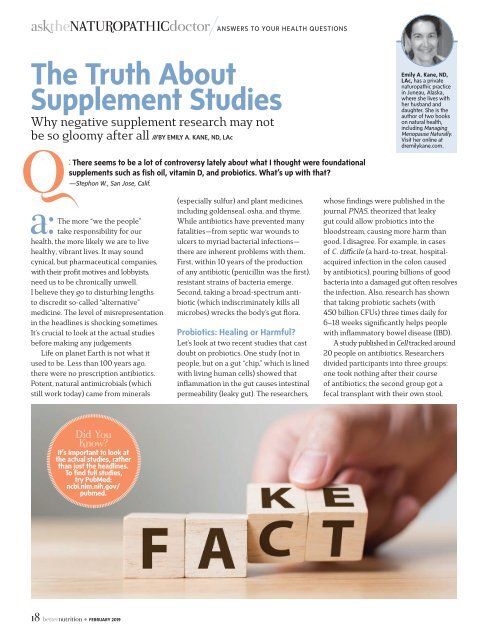Create successful ePaper yourself
Turn your PDF publications into a flip-book with our unique Google optimized e-Paper software.
asktheNATUROPATHICdoctor/ANSWERS TO YOUR HEALTH QUESTIONS<br />
The Truth About<br />
Supplement Studies<br />
Why negative supplement research may not<br />
be so gloomy after all /// BY EMILY A. KANE, ND, LAc<br />
Emily A. Kane, ND,<br />
LAc, has a private<br />
naturopathic practice<br />
in Juneau, Alaska,<br />
where she lives with<br />
her husband and<br />
daughter. She is the<br />
author of two books<br />
on natural health,<br />
including Managing<br />
Menopause Naturally.<br />
Visit her online at<br />
dremilykane.com.<br />
: There seems to be a lot of controversy lately about what I thought were foundational<br />
supplements such as fish oil, vitamin D, and probiotics. What’s up with that?<br />
—Stephon W., San Jose, Calif.<br />
a:The more “we the people”<br />
take responsibility for our<br />
health, the more likely we are to live<br />
healthy, vibrant lives. It may sound<br />
cynical, but pharmaceutical companies,<br />
with their profit motives and lobbyists,<br />
need us to be chronically unwell.<br />
I believe they go to disturbing lengths<br />
to discredit so-called “alternative”<br />
medicine. The level of misrepresentation<br />
in the headlines is shocking sometimes.<br />
It’s crucial to look at the actual studies<br />
before making any judgements<br />
Life on planet Earth is not what it<br />
used to be. Less than 100 years ago,<br />
there were no prescription antibiotics.<br />
Potent, natural antimicrobials (which<br />
still work today) came from minerals<br />
(especially sulfur) and plant medicines,<br />
including goldenseal, osha, and thyme.<br />
While antibiotics have prevented many<br />
fatalities—from septic war wounds to<br />
ulcers to myriad bacterial infections—<br />
there are inherent problems with them.<br />
First, within 10 years of the production<br />
of any antibiotic (penicillin was the first),<br />
resistant strains of bacteria emerge.<br />
Second, taking a broad-spectrum antibiotic<br />
(which indiscriminately kills all<br />
microbes) wrecks the body’s gut flora.<br />
Probiotics: Healing or Harmful?<br />
Let’s look at two recent studies that cast<br />
doubt on probiotics. One study (not in<br />
people, but on a gut “chip,” which is lined<br />
with living human cells) showed that<br />
inflammation in the gut causes intestinal<br />
permeability (leaky gut). The researchers,<br />
whose findings were published in the<br />
journal PNAS, theorized that leaky<br />
gut could allow probiotics into the<br />
bloodstream, causing more harm than<br />
good. I disagree. For example, in cases<br />
of C. difficile (a hard-to-treat, hospitalacquired<br />
infection in the colon caused<br />
by antibiotics), pouring billions of good<br />
bacteria into a damaged gut often resolves<br />
the infection. Also, research has shown<br />
that taking probiotic sachets (with<br />
450 billion CFUs) three times daily for<br />
6–18 weeks significantly helps people<br />
with inflammatory bowel disease (IBD).<br />
A study published in Cell tracked around<br />
20 people on antibiotics. Researchers<br />
divided participants into three groups:<br />
one took nothing after their course<br />
of antibiotics; the second group got a<br />
fecal transplant with their own stool,<br />
Did You<br />
Know?<br />
It’s important to look at<br />
the actual studies, rather<br />
than just the headlines.<br />
To find full studies,<br />
try PubMed:<br />
ncbi.nlm.nih.gov/<br />
pubmed.<br />
18 • FEBRUARY <strong>2019</strong>

















